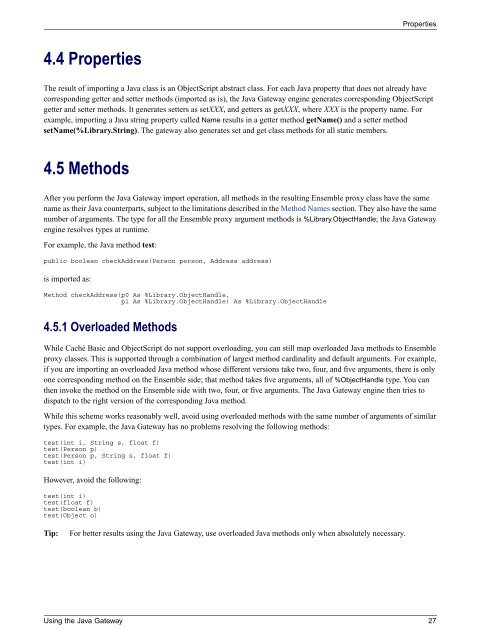Using the Java Gateway in a Production - InterSystems Documentation
Using the Java Gateway in a Production - InterSystems Documentation
Using the Java Gateway in a Production - InterSystems Documentation
You also want an ePaper? Increase the reach of your titles
YUMPU automatically turns print PDFs into web optimized ePapers that Google loves.
Properties<br />
4.4 Properties<br />
The result of import<strong>in</strong>g a <strong>Java</strong> class is an ObjectScript abstract class. For each <strong>Java</strong> property that does not already have<br />
correspond<strong>in</strong>g getter and setter methods (imported as is), <strong>the</strong> <strong>Java</strong> <strong>Gateway</strong> eng<strong>in</strong>e generates correspond<strong>in</strong>g ObjectScript<br />
getter and setter methods. It generates setters as setXXX, and getters as getXXX, where XXX is <strong>the</strong> property name. For<br />
example, import<strong>in</strong>g a <strong>Java</strong> str<strong>in</strong>g property called Name results <strong>in</strong> a getter method getName() and a setter method<br />
setName(%Library.Str<strong>in</strong>g). The gateway also generates set and get class methods for all static members.<br />
4.5 Methods<br />
After you perform <strong>the</strong> <strong>Java</strong> <strong>Gateway</strong> import operation, all methods <strong>in</strong> <strong>the</strong> result<strong>in</strong>g Ensemble proxy class have <strong>the</strong> same<br />
name as <strong>the</strong>ir <strong>Java</strong> counterparts, subject to <strong>the</strong> limitations described <strong>in</strong> <strong>the</strong> Method Names section. They also have <strong>the</strong> same<br />
number of arguments. The type for all <strong>the</strong> Ensemble proxy argument methods is %Library.ObjectHandle; <strong>the</strong> <strong>Java</strong> <strong>Gateway</strong><br />
eng<strong>in</strong>e resolves types at runtime.<br />
For example, <strong>the</strong> <strong>Java</strong> method test:<br />
public boolean checkAddress(Person person, Address address)<br />
is imported as:<br />
Method checkAddress(p0 As %Library.ObjectHandle,<br />
p1 As %Library.ObjectHandle) As %Library.ObjectHandle<br />
4.5.1 Overloaded Methods<br />
While Caché Basic and ObjectScript do not support overload<strong>in</strong>g, you can still map overloaded <strong>Java</strong> methods to Ensemble<br />
proxy classes. This is supported through a comb<strong>in</strong>ation of largest method card<strong>in</strong>ality and default arguments. For example,<br />
if you are import<strong>in</strong>g an overloaded <strong>Java</strong> method whose different versions take two, four, and five arguments, <strong>the</strong>re is only<br />
one correspond<strong>in</strong>g method on <strong>the</strong> Ensemble side; that method takes five arguments, all of %ObjectHandle type. You can<br />
<strong>the</strong>n <strong>in</strong>voke <strong>the</strong> method on <strong>the</strong> Ensemble side with two, four, or five arguments. The <strong>Java</strong> <strong>Gateway</strong> eng<strong>in</strong>e <strong>the</strong>n tries to<br />
dispatch to <strong>the</strong> right version of <strong>the</strong> correspond<strong>in</strong>g <strong>Java</strong> method.<br />
While this scheme works reasonably well, avoid us<strong>in</strong>g overloaded methods with <strong>the</strong> same number of arguments of similar<br />
types. For example, <strong>the</strong> <strong>Java</strong> <strong>Gateway</strong> has no problems resolv<strong>in</strong>g <strong>the</strong> follow<strong>in</strong>g methods:<br />
test(<strong>in</strong>t i, Str<strong>in</strong>g s, float f)<br />
test(Person p)<br />
test(Person p, Str<strong>in</strong>g s, float f)<br />
test(<strong>in</strong>t i)<br />
However, avoid <strong>the</strong> follow<strong>in</strong>g:<br />
test(<strong>in</strong>t i)<br />
test(float f)<br />
test(boolean b)<br />
test(Object o)<br />
Tip:<br />
For better results us<strong>in</strong>g <strong>the</strong> <strong>Java</strong> <strong>Gateway</strong>, use overloaded <strong>Java</strong> methods only when absolutely necessary.<br />
<strong>Us<strong>in</strong>g</strong> <strong>the</strong> <strong>Java</strong> <strong>Gateway</strong> 27

















